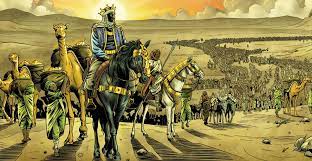
A thief steals hundreds of millions of dollars of artwork from you
Decades later, he sells the stolen art to other collectors and makes a fortune
Over 120 years later, he returns the artwork to you, except it's only a FRACTION of what was stolen!
This. All. Happened.
Thread:
Decades later, he sells the stolen art to other collectors and makes a fortune
Over 120 years later, he returns the artwork to you, except it's only a FRACTION of what was stolen!
This. All. Happened.
Thread:
The year is 1897, and over 1,000 British troops storm the Kingdom of Benin: a well-developed, sovereign empire in what is current-day Nigeria.
The British plan was to depose the Benin Empire's king and annex the territory, which was situtated strategically on the African coast.
The British plan was to depose the Benin Empire's king and annex the territory, which was situtated strategically on the African coast.

When they arrived, the British didn't just annex.
They pillaged.
They destroyed.
One historian wrote that the British "scorched the earth with rockets, fire and mines."
They killed civilian men, women, and children.
With so much death, Benin City "reeked of human blood."
They pillaged.
They destroyed.
One historian wrote that the British "scorched the earth with rockets, fire and mines."
They killed civilian men, women, and children.
With so much death, Benin City "reeked of human blood."

In all of the carnage, the British feared:
How would they fund this expensive military conquest and takeover?
The Foreign Secretary had an idea.
He had written back home: "I have reason to hope that sufficient ivory would be found in the King's house to pay the expenses."
How would they fund this expensive military conquest and takeover?
The Foreign Secretary had an idea.
He had written back home: "I have reason to hope that sufficient ivory would be found in the King's house to pay the expenses."

But in Benin City, the British found a whole lot more than just ivory.
They found exquisitely handcrafted masks and plaques made of bronze, brass, ivory, and wood.
Scientist Henry Forbes was "enchanted by the high artistic quality and technical precision
of Benin artifacts."
They found exquisitely handcrafted masks and plaques made of bronze, brass, ivory, and wood.
Scientist Henry Forbes was "enchanted by the high artistic quality and technical precision
of Benin artifacts."

For the British, it was payday.
They took the artifacts - known today as the 'Benin Bronzes' - back to England, which were sold over the following decades in the likes of the UK, the US, Germany, and Canada.
In fact, in 2015, one Benin Bronze seen below sold for $13.8 million!
They took the artifacts - known today as the 'Benin Bronzes' - back to England, which were sold over the following decades in the likes of the UK, the US, Germany, and Canada.
In fact, in 2015, one Benin Bronze seen below sold for $13.8 million!

Even though these treasures came from modern-day Nigeria, the two biggest collections today sit in German and British museums, which begs an important question:
124 years later after the Benin Bronzes were stolen, why haven't they been returned to Benin City in Nigeria yet?
124 years later after the Benin Bronzes were stolen, why haven't they been returned to Benin City in Nigeria yet?

First, a majority of the artwork sits in museums and private collections around the world, which fetch pretty pennies for their owners!
Second, the British Museum Act of 1963 states museums are "prevented from permanently returning items" to their original owners.
Imagine that!
Second, the British Museum Act of 1963 states museums are "prevented from permanently returning items" to their original owners.
Imagine that!

Now, it seems some Benin Bronzes are on their way home, as Germany is returning a "substantial number" of artifacts.
However, even if Germany returns all of the pieces (which sit in Berlin, Hamburg, and Dresden), "this would not amount to much more than 10% of what was looted."
However, even if Germany returns all of the pieces (which sit in Berlin, Hamburg, and Dresden), "this would not amount to much more than 10% of what was looted."
But once the Bronzes do return home, there is debate in Nigeria about where to put them
Some want the Bronzes to be discreetly kept at what was the original palace of the kingdom
Others are pushing for a new, private museum built by who else but British and German contractors!
Some want the Bronzes to be discreetly kept at what was the original palace of the kingdom
Others are pushing for a new, private museum built by who else but British and German contractors!

Even when Germany does return the Benin Bronzes to Nigeria, there is still work to be done.
Perhaps Nigerian artist Victor Ehikhamenor summed it up best:
"We didn't expect this process to be a cakewalk. Colonialism yoked us together. We just need to speak with one voice."
Perhaps Nigerian artist Victor Ehikhamenor summed it up best:
"We didn't expect this process to be a cakewalk. Colonialism yoked us together. We just need to speak with one voice."
Learn something new today?
Follow @DavidZabinsky for more informative threads on the cities, countries, and people of our world.
Follow @DavidZabinsky for more informative threads on the cities, countries, and people of our world.
Interested in international entrepreneurship?
Check out 'Not From Silicon Valley': stories of trial and triumph from founders in emerging and frontier economies.
Available wherever you get your podcasts.
podcasts.apple.com/us/podcast/not…
Check out 'Not From Silicon Valley': stories of trial and triumph from founders in emerging and frontier economies.
Available wherever you get your podcasts.
podcasts.apple.com/us/podcast/not…
Sources:
bbc.com/news/world-afr…
bbc.com/news/world-afr…
theconversation.com/germany-is-ret…
dspace5.zcu.cz/bitstream/1102…
bbc.com/news/world-afr…
bbc.com/news/world-afr…
theconversation.com/germany-is-ret…
dspace5.zcu.cz/bitstream/1102…
@victorsozaboy is the eloquent wordsmith!
• • •
Missing some Tweet in this thread? You can try to
force a refresh






